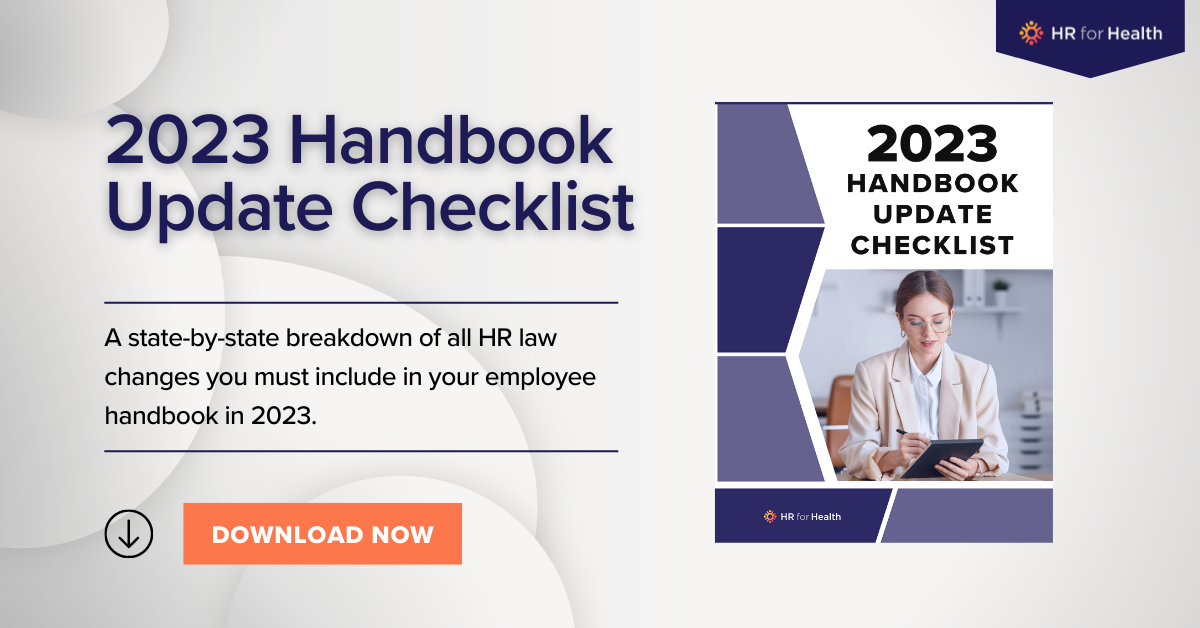An employee handbook (sometimes referred to as an employee manual) is the cornerstone in any healthcare practice.
As a document that outlines the expectations, rules, and guidelines for employees to follow within an organization, it also serves as a reference guide to help employees understand their rights, responsibilities, and obligations as an employee.
Now that we understand the basics, let’s discuss the six major reasons an employee handbook can help you as healthcare practice owner, employer, and, ultimately, businessperson.
Recommended Resource
The Importance of Having an Employee Handbook in Your Healthcare Practice
It’s important to ensure that your employees understand the expectations and policies of their workplace. Creating a comprehensive employee handbook will outline the roles, responsibilities, and expectations of employees, and should also include details about compensation, benefits, and other important practice information.
Having an employee handbook helps protect your healthcare practice from legal liability and provides an efficient way to communicate essential information to employees. It is a vital part of having a successful and productive workplace.
1. An Employee Manual will Bind Your Practice Together

As we’ve discussed, employee manuals provide guidelines for how your team should operate in a professional and effective manner. An employee manual also enables employers to protect their organization by providing a reference tool to handle potential disputes or grievances. By creating a clear and consistent document, employers can ensure that their team is working together in a cohesive and organized manner.
Employee handbooks are particularly important for healthcare and medical practices, as they can provide liability protection and ensure that all team members are aware of their roles and responsibilities. They can also be used to ensure that all employees have a clear understanding of the practice’s goals and objectives.
2. Employee Handbooks Serve As Legal Protection for Your Healthcare Practice
When done right, your employee handbook will help prevent misunderstandings that can result in legal disputes. These handbooks often include instructions on how to handle specific situations, as well as policies related to work hours, leaves of absence, drug and alcohol use, harassment, and other important topics.
Additionally, employee handbooks can help protect healthcare practices from legal claims by making sure all employees are aware of their rights during employment.
3. Employee Manuals Introduce New Hires To the Culture of Your Healthcare Practice
An employee manual is an important tool for introducing new hires to the culture of the healthcare practice. It outlines the organization’s values and expectations, as well as the policies and procedures that all employees are expected to follow.
It also serves as a resource for new hires to refer to when they have questions or need more information. By providing this information upfront, the practice can ensure that new hires understand and appreciate the culture and values of the practice, which will help them to be successful in their roles.
4. An Employee Handbook Communicates Expectations To All Employees in a Healthcare Practice
An employee handbook is a valuable tool for communication. It provides a clear set of guidelines and policies that set the boundaries of acceptable behavior and performance. It outlines the rules and regulations, job responsibilities, and how to handle common workplace issues. A well-crafted employee handbook can help ensure that everyone is on the same page while creating a positive and productive work environment.
It can also provide clarity to employees on the practice’s expectations for performance.
5. An Employee Handbook Explains the Rights and Privileges of Your Employees
An employee handbook is an important resource that outlines the rights and privileges of all employees within a company. It should include information on topics such as workplace safety, anti-discrimination policies, compensation and benefits, leave of absence policies, and more.
Additionally, the handbook should clearly explain the expectations of all employees, such as following the company’s code of conduct, understanding the company culture, and respecting the rights of other employees. It is important to ensure that each employee is aware of their rights and privileges in the workplace, so that they can feel safe, secure, and valued in their job.
6. Employee Handbooks Ensure Legal Compliance in Your Healthcare Practice
Healthcare practice employers should ensure that their employees are acting in accordance with the applicable state and federal laws. An employee handbook can help with just that.
Employee handbooks also provide a written record of policies, procedures, and other important information that can be used to demonstrate that the company is taking steps to comply with the law. In addition, employee handbooks can help ensure that employees are aware of their rights and responsibilities under the law and that they understand the consequences of violating them.
Create Your Free Employee Handbook Here
.png)
How HR for Health Can Help with Your Employee Handbook
An HR software can be a great tool for streamlining the creation and management of your employee handbook. It can help you create a comprehensive document that outlines the policies and procedures for your company, as well as provide employees with easy access to the information they need.
HR for Health’s all-in-one HR solution will help you can create a state- and industry-specific employee handbook that gets a final review from our team of HR professionals. Follow our step-by-step questionnaire to build your unique employee handbook and send to your team for signed acknowledgement. Additionally, our software will automatically update your handbook based on new HR laws, ensuring that everyone has access to the latest version.
See for yourself.
Schedule an HR consultation with us by booking time here or calling us at (888) 316-9284.




